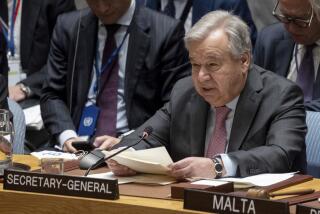U.N. Chief Suggests 164-Nation Talks on Protecting Palestinians Under Israel Rule : Violence: He cites 1949 Geneva convention on civilians in occupied territories. Jersualem’s cooperation is called ‘absolutely essential.’
- Share via
UNITED NATIONS — Declaring that the cooperation of Israel is “absolutely essential,” U.N. Secretary General Javier Perez de Cuellar on Thursday suggested a meeting of 164 nations to discuss ways of protecting Palestinians in Israeli-occupied territories.
Perez de Cuellar’s tone was cautious but critical of Israel in the long-awaited report to the U.N. Security Council in the wake of violence that killed 20 Palestinians in Jerusalem on Oct. 8.
The secretary general warned that the “potential for friction and confrontation between Israelis and Palestinians has remained very high,” but said it is up to the Security Council to decide whether to send military or civilian observers to Jerusalem.
“It is essential . . . that progress be made, and soon,” Perez de Cuellar declared as Arab states sympathetic to the Palestine Liberation Organization began drafting a new Security Council resolution calling for either military or civilian U.N. observers to be sent to the region.
Whether the council will next consider Jerusalem or further Persian Gulf resolutions was the subject of behind-the-scenes discussions among Security Council members Thursday. It was understood that the United States is eager for the council to continue on the gulf track and consider Jerusalem later.
“The tragic events of Oct. 8 are only the most recent of many grave incidents in the (Israeli-occupied) territories that have resulted in the deaths and wounding of a large number of civilians,” Perez de Cuellar said in the report.
He said that not only Palestinians but “individuals from all walks of life in the territories” had conveyed the message to him that “far more is required on the part of the international community to ensure the safety and protection of the Palestinian civilian population in the occupied territories.”
The Security Council called for the secretary general’s report in a resolution it unanimously passed Oct. 12, condemning Israel for the killings in East Jerusalem. The violence occurred when Jewish worshipers were stoned by Palestinians on the Temple Mount and Israeli security forces opened fire.
But when Perez de Cuellar sought to send a mission to the area, he was rebuffed by Israel. His report noted that Israeli authorities had reiterated their position that Jerusalem is the sovereign capital of Israel and had told him “there is no room for any involvement on the part of the United Nations in any matter relating to Jerusalem.”
Nonetheless, the secretary general suggested that the Security Council might wish to call for a meeting of the signatories of the Fourth Geneva Convention, covering the protection of civilians in territories occupied during a war. The convention was signed Aug. 12, 1949, and 164 countries, including Israel, are parties to the accord.
Perez de Cuellar said such a meeting could discuss additional measures to protect the Palestinians.
A spokesman for the International Committee of the Red Cross, which acts as custodian of the convention, said that if such a meeting were held, it could be convened in a matter of weeks, probably in Geneva. He indicated his organization already has a sizable delegation in Jerusalem and, during the violence on the Temple Mount, Red Cross workers were very active in helping to evacuate the wounded and in securing free passage of ambulances to hospitals.
“What is needed now is for the occupying power to abide by the Geneva Convention,” said Jean-Paul Fallet, head of the International Committee of the Red Cross’ observer delegation at the United Nations.
In his report, Perez de Cuellar stressed that he does not have the power to send military or civilian observers to Jerusalem, which he said is a matter for consideration by the Security Council.
Commenting on the report, Yuval Rotem, press spokesman for the Israeli U.N. mission, noted that his nation is a party to the Geneva Convention but reiterated that Israel has “sole responsibility . . . including the duty to maintain law and order” in the occupied territories.
“This responsibility is not subject to review or intervention by other authorities,” Rotem said.
More to Read
Sign up for Essential California
The most important California stories and recommendations in your inbox every morning.
You may occasionally receive promotional content from the Los Angeles Times.













